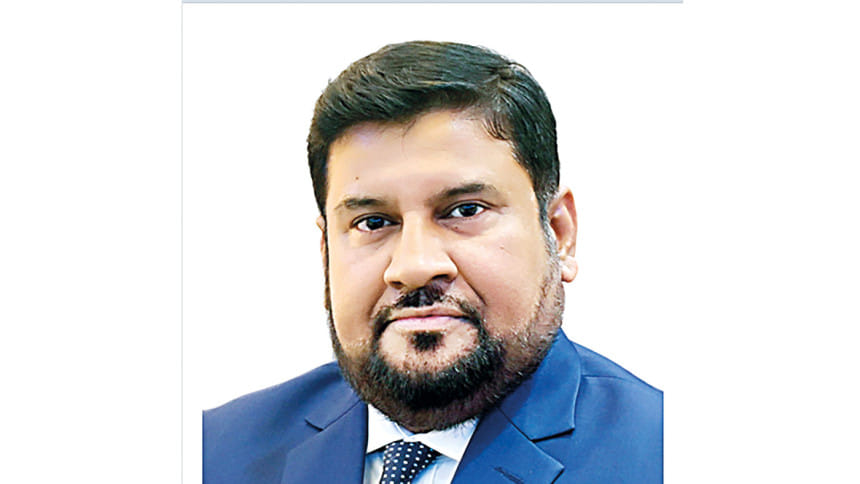Prioritising environmentally friendly and sustainable projects

M. Shamsul Arefin
Managing Director, NCC Bank
The Daily Star (TDS): How would you assess the current state of sustainable banking in Bangladesh?
M. Shamsul Arefin (MSA): Over the past five years, driven by Bangladesh Bank's directives, low-interest loan facilities, preferential treatment from correspondent banks and multilateral lenders, and their own initiatives, banks and non-banking financial institutions (NBFIs) have increasingly prioritised environmentally friendly and sustainable projects for lending. Currently, around 33 percent of the total bank loan portfolio comprises sustainable and eco-friendly project loans, while for NBFIs, the figure stands at 28 percent.
Bangladesh Bank has instructed banks and NBFIs to allocate at least 5 percent of total loans and advances to green sectors and 40 percent to broader sustainable projects. Notably, despite defaults affecting 24 percent of bank loans and 35 percent of NBFI loans as of last March, the default rate for sustainable and eco-friendly loans remains below 2 percent — a significant achievement.
Loans in these sectors nearly doubled within a year, rising from Tk. 361,000 crore in March 2024 to about Tk. 605,000 crore by March 2025, with the number of borrowers increasing from 1.31 million to 2.58 million.
TDS: What sustainable financing/refinancing schemes does your bank offer, particularly for SMEs, women entrepreneurs, or other environmentally responsible enterprises?
MSA: We offer term loans for women entrepreneurs up to BDT 1.00 crore at an annual interest rate of 5 percent under the Bangladesh Bank refinancing scheme. To support CMSMEs, we offer a refinance scheme at 5 percent interest, a pre-finance facility at 7 percent interest, and for start-ups, financing at 4 percent interest under the Bangladesh Bank refinance schemes. We also facilitate refinancing for small account holders (no-frill accounts having an initial balance of BDT 10/50/100) and agro-product processing enterprises at 7 percent interest.
Our "NCC Parama" is a dedicated women's banking initiative designed to empower women financially and help them achieve self-reliance by providing training and awareness programmes.
TDS: What initiatives has your bank undertaken to promote sustainable banking, and what measures have you implemented to reduce your carbon footprint?
MSA: To foster sustainable banking, NCC provides regular employee training and organises community initiatives such as tree plantation programmes and CSR projects for marginal farmers and underserved people. Recently, we organised a tree plantation initiative titled "NCC Nishorgo: Apnar Sathe, Sabujer Pothe," where 5,300 saplings were planted in 40 schools nationwide. This promotes environmental awareness and contributes to a greener Bangladesh for future generations.
Our Bank has implemented "green office guidelines" to reduce environmental impact. To encourage our customers to bank with us digitally, we have rolled out the "NCC Always" mobile app for individual clients and the "NCC Icon" internet banking service for corporate clients. Additionally, our customers can use our debit and credit cards in any ATM booth free of cost — more than 14,000 ATMs nationwide. In 2024, 58 percent of transactions were processed digitally.
Moreover, as a Partnership for Carbon Accounting Financials (PCAF) signatory, we measure and disclose financed greenhouse gas emissions. Our sustainability strategy aligns closely with the UN's Sustainable Development Goals.
TDS: What challenges has your bank encountered in adopting and promoting sustainable banking practices?
MSA: Banks sometimes face technical difficulties in assessing environmental and social impacts and in calculating emissions by borrowers. The green capital market in Bangladesh is still in its growth stage, and refinancing arrangements for green projects remain limited. Customer awareness of sustainable finance benefits can also be improved.
Furthermore, it is often challenging to access harmonised data on businesses' environmental and social performance due to the absence of uniform reporting standards (GRI, IFRS, SASB, TCFD, etc.), which hampers accurate assessment and monitoring of the sustainability impact of borrowers. NCC Bank strives to overcome these challenges through customer awareness initiatives, capacity-building programmes, stakeholder partnerships, and enhanced service offerings.
TDS: What are your bank's plans to advance sustainable banking, and what support do you seek from the government?
MSA: Our plans are to expand our sustainable finance portfolios significantly, with a focus on women's banking, SME banking, and inclusive financing by introducing innovative, green-centric financial products, supported by digitalised delivery channels and improved customer outreach. We have set specific, measurable, achievable, relevant, and time-bound (SMART) targets for green finance to fully integrate Environmental, Social and Governance (ESG) factors into all business operations.
We will continue our efforts to collaborate with international partners and NGOs for funding and expertise. We will publish an Annual Sustainability Report to ensure transparency, invest in specialised employee training, and enhance our CSR initiatives on sustainability.
While Bangladesh Bank's existing policies are excellent, we also expect incentives for top-performing banks, such as tax benefits. The introduction of green pre-finance, making the fund more accessible, and increasing the limit for green refinancing funds are crucial given the growing demand.
It is equally imperative to include ESG disclosures from all businesses in their financial statements to provide banks with the necessary data for due diligence and credit analysis. Finally, capacity-building programmes for banking professionals and companies are vital to ensure the long-term success of sustainable finance.

 For all latest news, follow The Daily Star's Google News channel.
For all latest news, follow The Daily Star's Google News channel. 



Comments